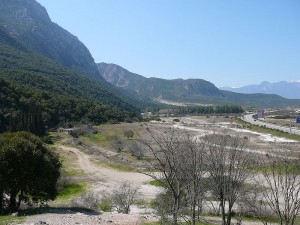Parts of an ancient Greek text have been discovered in the Austrian National Library describing another Battle of Thermopylae.
Details of the battle were found among several other fragments, all initially recorded by the Athenian writer Dexippus in the 3rd century CE and copied probably during the 11th century. Although originally found, and printed in German, in 2014, this is the first time the tale has been told in English, thanks to the work of Christopher Mallan from Oxford University and Caillan Davenport from the University of Queensland.
In the fragment, Dexippus tells of the struggle of the Greeks and Romans (who at that point controlled Greece) to fight off a wave of Gothic invasions. During the 260s CE, and as part of a larger Gothic invasion of southern Europe, a Gothic group called the Heruli attempted to capture the Greek city of Thessalonica, but 'those on the walls defended themselves valiantly, warding off the battle columns with the assistance of many hands.' Tiring of Thessalonica, the Gothic force turned south towards Athens, but were met by the Greeks in the narrow pass at Thermopylae in about 267CE. [caption id="attachment_2497" align="alignright" width="300"]
[caption id="attachment_2497" align="alignright" width="300"] View of the Thermopylae pass from the area of the Phocian Wall. In ancient times, the coastline would have been much closer to the mountain, near the road to the right. Photo: Fkerasar[/caption]
View of the Thermopylae pass from the area of the Phocian Wall. In ancient times, the coastline would have been much closer to the mountain, near the road to the right. Photo: Fkerasar[/caption]
Despite the defensible position, it must have been daunting to the band of local Greeks who, carrying 'small spears...or whatever each man could arm himself with...completely fortified the perimeter wall and devoted themselves to its protection with haste.' Dexippus records a stirring speech given by the commander of the Greek force, Marianus, to inspire the troops with other great deeds conducted there, including the holding back of the Persian army by the Spartans, Thespians and Thebans in 480BCE: 'O Greeks, the occasion of our preservation for which you are assembled and the land in which you have been deployed are both truly fitting to evoke the memory of virtuous deeds. For your ancestors, fighting in this place in former times, did not let Greece down and deprive it of its free state. In previous attacks, you seemed terrifying to the enemies. On this account of these things, future events do not appear to me not without hope...' Sadly, we don't know what else Marianus may - or may not (as the speech was probably an invention of Dexippus) - have said, as here the text runs out.
'O Greeks, the occasion of our preservation for which you are assembled and the land in which you have been deployed are both truly fitting to evoke the memory of virtuous deeds. For your ancestors, fighting in this place in former times, did not let Greece down and deprive it of its free state. In previous attacks, you seemed terrifying to the enemies. On this account of these things, future events do not appear to me not without hope...' Sadly, we don't know what else Marianus may - or may not (as the speech was probably an invention of Dexippus) - have said, as here the text runs out.
For all the encouraging words, it would seem those defending the pass fell, and the Heruli went on to sack Athens, Corinth, Argos and Sparta. Dexippus, as both a historian and a man who reinvigorated Greek patriotism, was remembered, and the base of a statue erected to honour him still exists in Athens.
Find out more here.

